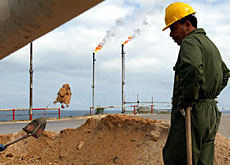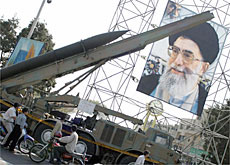Swiss seek business opportunities in Libya

A Swiss business delegation has begun a four-day visit to Libya in a bid to boost trade relations between the two countries.
The visit comes as Tripoli begins to open its market up to foreign businesses following the lifting of economic sanctions.
The delegation, which will be in Libya until May 4, is led by the head of bilateral economic relations at the State Secretariat for Economic Affairs (Seco), Jörg Reding.
Reding is accompanied by other members of Seco, plus delegates from the Swiss-Arabic chamber of commerce and 20 Swiss business representatives – chiefly from the financial, education, tourism, consulting, textile, health and food sectors.
Tripoli has been looking to open up its markets to foreign businesses since the United Nations Security Council voted to lift economic sanctions against the country last September.
Lockerbie
The embargoes were imposed after the 1988 mid-air attack on a Boeing jumbo jet over Lockerbie, Scotland.
A Scottish court convicted a Libyan man of mass murder in connection with the deaths of 270 people in the attack.
Since the restrictions were lifted, Libyan leader Moammar Gaddafi has been trying to forge stronger ties with the outside world. On Tuesday, he paid a historic visit to the European Union headquarters in Brussels.
Reding says these developments, along with moves to reform and liberalise the Libyan market, could spell good news for Swiss businesses.
“A lot of things have been happening in the past couple of months,” Reding told swissinfo. “Libya is really opening up its economy and is introducing various reforms.
“Therefore it is an explorative mission, to see what is really going on on the ground.”
Business opportunities
The delegation aims to build on already good relations between the two countries. Libya is Switzerland’s second-largest trading partner in Africa (South Africa is the biggest).
Libya is Switzerland’s biggest source of energy, with Libyan petroleum making up over 30 per cent of Switzerland’s supply. Petroleum makes up 90 per cent of Libyan exports to Switzerland.
But Reding says there is still room for improvement in the trade relationship, particularly as regards Swiss exports to Libya.
While imports from Libya total more than SFr750 million ($580 million) per year, Swiss exports come to just SFr120-130 million.
Reding says the delegation will be seeking to promote Switzerland’s key industries, such as the chemical, pharmaceutical and agricultural sectors.
Tourism is also seen as an untapped market for foreign investors. The country boasts a long stretch of Mediterranean coastline, which could be developed to attract holidaymakers.
To this end, Switzerland is taking representatives from the hotel management and hospitality training sectors on the trip.
Stiff competition
Swiss businesses are not the only ones vying for contracts in Libya.
Since Tripoli began to open up its markets, foreign companies have shown a growing interest in the country and the business opportunities it has to offer.
“There is a lot of competition now in Libya,” said Reding. “What we hear from Tripoli is that each day there are business delegations going there. But I think we have an excellent reputation in Libya so we should exploit it also.”
Reding is confident Switzerland’s already good relationship with Libya should stand it in good stead to win the sought-after business.
“I believe Switzerland has a good reputation in Libya, as it has with all North African countries because of the experience [these countries] have had in the past with us in sectors such as the pharmaceutical and the service industries.”
Cultural differences
The cultural and political differences between the two countries may throw up some challenges for Swiss businesses interested in trading with Libya.
Reding foresees some teething problems with the different form of bureaucracy under Gaddafi’s regime.
“If Swiss people go to Libya they must know there are no quick fixes, and they must adapt to the different culture and accept the way they are doing business there, and that things might go slower than in other countries.”
Another potential hurdle is the ongoing criticism of Libya’s regime by human rights groups. In February, Amnesty International published a report accusing Libya of continuing human rights abuses and of fostering a “climate of fear” among the population.
But Reding says these are political matters and as such are not connected with the business community.
swissinfo, Joanne Shields
In 2002, Switzerland imported SFr657 million worth of goods from Libya. This figure rose to SFr755 million in 2003, 90 % of which was oil.
Exports from Switzerland to Libya were worth SFr120 million in 2003.
Machinery, pharmaceuticals and vehicles are the three biggest Swiss exports to Libya.
The United Nations lifted economic sanctions in September and the United States lifted restrictions last week. But trade restrictions with Europe remain.
The Libyan economy grew by 5.6 % in 2003, boosted by the lifting of UN sanctions.

In compliance with the JTI standards
More: SWI swissinfo.ch certified by the Journalism Trust Initiative


You can find an overview of ongoing debates with our journalists here. Please join us!
If you want to start a conversation about a topic raised in this article or want to report factual errors, email us at english@swissinfo.ch.